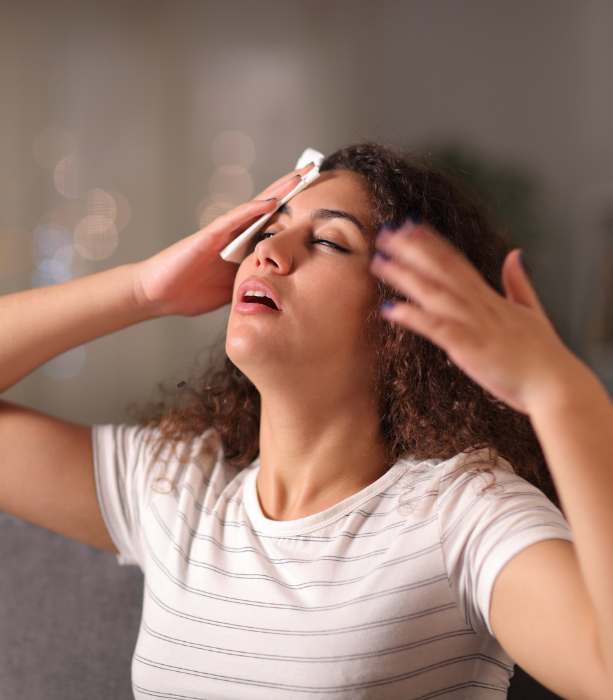Night Sweats
Night Sweats and Hormonal Imbalance
Night sweats are one of the most uncomfortable symptoms associated with perimenopause, menopause, and hormone replacement therapy (HRT) adjustments. They involve intense sweating during the night, which can leave you drenched and disrupt your sleep cycle. While night sweats are commonly linked to hormonal changes, the experience can be different for each person. Understanding the role hormones play in night sweats, as well as ways to manage them, can significantly improve your comfort and quality of sleep during this phase of life.
What Causes Night Sweats?
Night sweats occur when your body’s internal temperature regulation system is thrown off balance, often due to hormonal fluctuations. These fluctuations influence how your body responds to temperature changes, leading to episodes of excessive sweating during the night. The hormones primarily involved are:
- Estrogen – Estrogen plays a key role in regulating the body’s temperature. When estrogen levels drop during menopause, the hypothalamus (the part of the brain responsible for temperature regulation) becomes more sensitive to small changes in body temperature. This leads to overheating, causing night sweats.
- Progesterone – Low progesterone levels can also affect sleep quality and contribute to temperature regulation issues. A drop in progesterone can cause the body to overheat during the night, triggering night sweats.
- Cortisol – High levels of stress and cortisol can increase the frequency and severity of night sweats. Stress-induced night sweats may also worsen during times of emotional imbalance.
- Testosterone – Testosterone plays a role in regulating sleep and body temperature. Fluctuating testosterone levels during menopause or HRT transitions can lead to night sweats as the body struggles to maintain a balanced temperature throughout the night.
What Night Sweats Feel Like
- Intense Sweating – Episodes of excessive sweating that can drench your clothes, sheets, and even your pillow.
- Flushed Skin – Redness or blotchiness of the skin, particularly in the face, chest, or upper body.
- Temperature Fluctuations – You may feel suddenly hot, then cold, followed by the sweat. After the sweat, you might feel chilled or shivery.
- Disrupted Sleep – The discomfort caused by night sweats can make it difficult to fall asleep or stay asleep, leading to fatigue and irritability the following day.
These episodes can occur intermittently or frequently, with some individuals experiencing night sweats multiple times per night.

Managing Night Sweats During Hormonal Changes
At New Insights Health & Wellness, we take a comprehensive approach to managing night sweats by addressing hormonal imbalances and supporting overall well-being. From lifestyle changes to medical interventions, we offer several strategies to reduce the frequency and intensity of night sweats.
✅ Hormone Therapy (HRT)
Hormone replacement therapy is often one of the most effective ways to manage night sweats. By replenishing estrogen, progesterone, and testosterone levels, HRT can help stabilize the body’s temperature regulation system, reducing or even eliminating night sweats.
✅ Dietary Adjustments
Certain foods and drinks can trigger night sweats. Consider limiting caffeine, alcohol, and spicy foods in the evening. Focus on eating light, easily digestible meals and include foods that support hormone balance, such as flaxseeds, nuts, and leafy greens.
✅ Stress Management
Since cortisol can exacerbate night sweats, incorporating stress-reducing techniques can be beneficial:
- Relaxing Bedtime Routine: Practice relaxation techniques before bed, such as deep breathing, meditation, or yoga.
- Mindfulness: Engage in mindfulness exercises to calm your mind and reduce the emotional triggers of night sweats.
✅ Cooling Techniques
Incorporating cooling techniques into your nighttime routine can help you sleep more comfortably:
- Cool the Bedroom: Keep your bedroom temperature low, using fans or air conditioning if needed.
- Wear Light, Breathable Fabrics: Opt for moisture-wicking fabrics like cotton or linen for pajamas and sheets to help manage sweat.
- Cool Compress: Place a cool compress or ice pack near your head or neck before bed to help regulate your body temperature.
- Hydrate: Drink water throughout the day and keep a glass of water by your bed. Staying hydrated can help your body cope with the effects of night sweats.
✅ Exercise and Sleep Hygiene
Maintaining a regular exercise routine and practicing good sleep hygiene can help regulate the body’s temperature control system:
- Regular Physical Activity: Exercise helps regulate the body’s internal systems, including temperature regulation. Just be mindful not to exercise too close to bedtime, as it could interfere with sleep.
- Consistent Sleep Schedule: Go to bed and wake up at the same time each day to support your body’s natural circadian rhythm and improve sleep quality.
The Emotional Impact of Night Sweats
The emotional toll of night sweats is often overlooked. The constant disruption to sleep can lead to irritability, mood swings, and increased stress. The anxiety of anticipating another night of discomfort can also make it more challenging to relax and rest. Addressing the emotional component of night sweats is essential for overall well-being, and finding strategies to manage them can help you regain control of your sleep and improve your quality of life.
